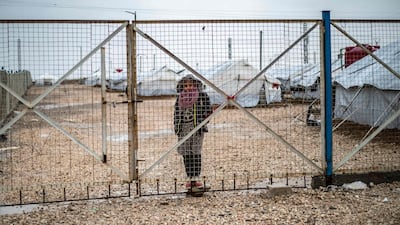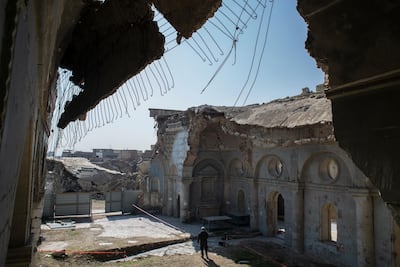It has been described as sowing poisonous seeds of the future. Capturing young minds in the schools and cultivating the thought process for ideological reasons is a big part of the extremist agenda.
The dangers posed by propaganda has been compounded by the school closures and stay-at-home orders during the Covid-19 pandemic. New warnings are being issued by officials about the increasingly youthful profile of counter-terror arrests in recent months.
A report from Hedayah, the Abu Dhabi-based specialist centre on extremism, has analysed the material prepared and published by ISIS for the classrooms that were under its control across Iraq and Syria in the mid-2010s.
Today, the people of Mosul, the Iraqi city that fell to ISIS in 2014, know that this is a trap for young minds. The report "Planting the Seeds of the Poisonous Tree" notes 2018 research that just 2.2 per cent of children attended ISIS schools in one of the city’s districts that year, compared to 80.3 per cent seven years ago.
But despite the evident lack of exposure of children in Mosul in recent years, the material itself remains significant. This is particularly important to note as ISIS is regrouping in former strongholds, while at the same time building its base in new territories and online.
Dominic Raab, the British Foreign Secretary, revealed a seven per cent growth in terrorism-related material online as well as more arrests. “We can see a worrying rise in the proportion of children and teenagers who are now being arrested for terrorism offences,” he warned.
Neil Basu, Britain's top counter-terrorism police officer, has said the pandemic lockdowns and growth of propaganda amounted to a "perfect storm", granting the extremists a platform to expose the most vulnerable to their narratives.
Mr Raab was also asked about the young inhabitants of the extremist camps in Syria, where scores of European children flocked to when ISIS was in control. He sought to reassure questioners that the situation was not prejudged. "We regard those children as the innocents of the scourge of war and wherever it's safe and possible, we will put our protective arms around them," he said.
To many others the situation is already quite different. No one wants the children back and no one wants their mothers. After so many years, they are still exposed to radical indoctrination by virtue of the camps where they are growing up.
Even before the rapid growth of ISIS, Iraq and Syria had many problems but the education system was a point of light. Surveys showed that 53 per cent of boys and 45 per cent of girls graduated the secondary school system – not great, but in the circumstances something to build on.
Schools run by ISIS were unlikely to be so well balanced. What the Hedayah report shows is that not only did parents withdraw consent but so to did teachers. The rigorous rules on segregation of boys and girls threw up even more hurdles to the ISIS system.
Evidence shows that a key feature of the classroom for the ISIS commanders was to train children to kill or prepare to be killed on some future battlefield. Children were forced to watch and enact the actions of executions. They were exposed to videos of suicide attacks until the notion of death became a normal concept.
A selection of the materials includes illustrated guides and checklists of what to do on Friday. There is a type of civics that was focused on governing the “Islamic state”, its geography and structures, plus the group's claims to land and territory and approach to controlling migration. Overall the Hedayah report sought to provide a detailed analysis of 29 textbooks in a cache of 67 documents retrieved from the ruins of the ISIS defeat in Mosul.
The intent of the authors of these textbooks was to create lifelong loyalists with deeply embedded extremist mindsets.
“In primary school, each student must learn to become a keeper of morals at home, learning to criticise acts considered heretical. Intermediary school will become a very important time,” according to one segment of the report. “We require more religious encounters and Islamic competitions in schools instead of in public places. In this phase, we must also intensify [extremist] teachings so that students learn individual weapons-handling and war tactics.”
Drawing a distinction between the everyday propaganda and the educational material, the researchers found that ISIS used “symbols, stories, and references to Islam in their educational curriculum much more frequently than their online propaganda”. Citing a 2016 study, they said that almost four fifths of Twitter propaganda used non-religious arguments.
The flip for school subject was that religious practice and beliefs predominated.
Broadly drawn themes were categorised as “Emphasis on Islam, Governing the Islamic 'state', and Doctrine and Creed”. These were designed with an internal loyalty dynamic that sought to make pupils "belongers" within the belief system. In a flip of the Twitter analysis, this comprised almost four fifths of the content.
The second set of themes was identified with "Enemies of ISIS and Fighting Enemies with Violence" and sought to build hostility to the external. Fighting the enemy is the dominant focus. Graphic depictions of conflict are incessant and Islamic history is portrayed in those terms.
Since losing its grip on schools, ISIS has developed similar approaches with computer games. It released an app targeting children with Islamic songs and filled with war-fighting images, including those of assault rifles and tanks.
All this points to the fact that ISIS is repurposing the school curriculum that it first began to flesh out when it held a swathe of territory in Iraq and Syria.
Damien McElroy is the London bureau chief at The National



